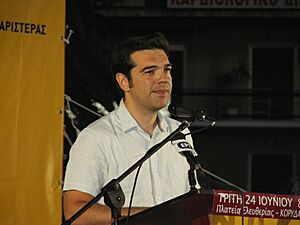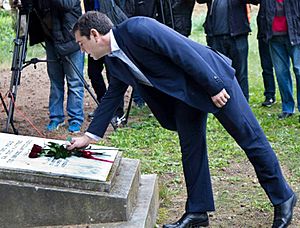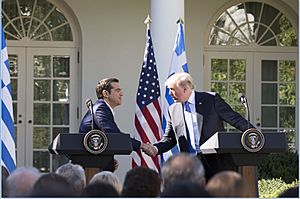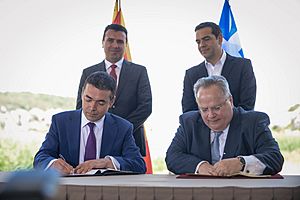Alexis Tsipras facts for kids
Quick facts for kids
Alexis Tsipras
|
|
|---|---|
| Aλέξης Τσίπρας | |
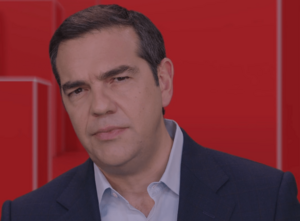
Tsipras in 2022
|
|
| Prime Minister of Greece | |
| In office 21 September 2015 – 8 July 2019 |
|
| President | Prokopis Pavlopoulos |
| Deputy | Yannis Dragasakis |
| Preceded by | Vassiliki Thanou-Christophilou (caretaker) |
| Succeeded by | Kyriakos Mitsotakis |
| In office 26 January 2015 – 27 August 2015 |
|
| President | Karolos Papoulias Prokopis Pavlopoulos |
| Deputy | Yannis Dragasakis |
| Preceded by | Antonis Samaras |
| Succeeded by | Vassiliki Thanou-Christophilou (caretaker) |
| Leader of the Opposition | |
| In office 8 July 2019 – 29 June 2023 |
|
| Prime Minister | Kyriakos Mitsotakis Ioannis Sarmas (caretaker) Kyriakos Mitsotakis |
| Preceded by | Kyriakos Mitsotakis |
| Succeeded by | Sokratis Famellos |
| In office 20 June 2012 – 26 January 2015 |
|
| Prime Minister | Antonis Samaras |
| Preceded by | Antonis Samaras |
| Succeeded by | Antonis Samaras |
| Acting Minister for Foreign Affairs | |
| In office 20 October 2018 – 15 February 2019 |
|
| Prime Minister | Himself |
| Preceded by | Nikos Kotzias |
| Succeeded by | Georgios Katrougalos |
| President of Syriza | |
| In office 7 October 2009 – 24 September 2023 |
|
| Preceded by | Alekos Alavanos |
| Succeeded by | Stefanos Kasselakis |
| President of Synaspismos | |
| In office 10 February 2008 – 10 July 2013 |
|
| Preceded by | Alekos Alavanos |
| Succeeded by | Position abolished |
| Member of the Hellenic Parliament | |
| Assumed office 4 October 2009 |
|
| Constituency | Athens A (2009–2015) Heraklion (2015–2019) Achaea (2019–2023) Piraeus A (2023–present) |
| Personal details | |
| Born | 28 July 1974 Athens, Greece |
| Political party | Syriza (2009–present) |
| Other political affiliations |
KKE (1988–1991) Synaspismos (1999–2013) |
| Domestic partner | Peristera Baziana |
| Children | 2 |
| Residence | Kypseli, Athens |
| Education | National Technical University of Athens |
| Occupation |
|
| Signature |  |
Alexis Tsipras (born 28 July 1974) is a Greek politician. He was the Prime Minister of Greece from 2015 to 2019. He was also the leader of the Greek political party Syriza from 2008 to 2023.
Tsipras became Prime Minister during a difficult time for Greece. The country was facing a big economic crisis. He first spoke out against strict money-saving rules. But later, his government had to put in place some of these rules. This happened as part of a big financial help plan from the European Union.
Tsipras was born in Athens. He was active in student protests in the 1990s. He studied civil engineering and worked in construction. He became a well-known figure in Greek politics. In 2015, he was named one of the 100 most influential people globally by TIME magazine.
Contents
Early Life and Education
Alexis Tsipras was born on July 28, 1974, in Athens, Greece. His father was a contractor, and his mother was from Greek Macedonia. His grandparents came to Greece from Turkey in 1923.
In the late 1980s, Tsipras joined the Communist Youth of Greece. In the early 1990s, he was a student at Ampelokipoi High School. He took part in student protests against new education plans. He became a spokesperson for the student movement. He even appeared on a TV show to talk about student rights.
Tsipras studied civil engineering at the National Technical University of Athens. He graduated in 2000. He then continued his studies in urban and regional planning. He worked as a civil engineer, mainly in Athens. As a university student, he was part of a left-wing group called "Enceladus." He was elected to the student union and the University Senate.
Political Journey Before Becoming Prime Minister
After 1991, Tsipras stayed with the Synaspismos political group. In 1999, he became the first political secretary of the Synaspismos Youth wing. He was seen as a moderate at this time. He helped create the Greek Social Forum. He also attended international protests against certain economic policies.
In 2004, Tsipras was elected to the Central Political Committee of Synaspismos. He was in charge of education and youth issues.
In the 2006 Greek local elections, Tsipras ran for Mayor of Athens. He was the candidate for the "Open City" Syriza group. He finished third, getting 10.51% of the votes. This earned him a seat on the Athens City Council.
In 2008, Tsipras was chosen as the leader of Syriza. He was 33 years old, making him the youngest leader of a Greek political party since 1931. In the 2009 Greek legislative election, he was elected to the Hellenic Parliament. He represented Athens A.
He led Syriza in the June 2012 Greek legislative election. The party gained a lot of support. He then became the Leader of the Opposition. He also formed his own shadow cabinet.
In 2013, Tsipras was put forward as a candidate for the President of the European Commission. He campaigned across Europe. He spoke about changing Europe's economic direction. Even though his group won many seats in Greece, they finished fifth overall in Europe.
Becoming Prime Minister
In January 2015, Tsipras led Syriza to victory in a general election. They won 149 out of 300 seats in the Greek Parliament. The next day, he formed a government with the Independent Greeks party.
On January 26, 2015, Tsipras became the youngest Prime Minister in Greek history. He took a civil oath, not a religious one. This was a new step for Greece. His first act was to visit the Resistance Memorial in Kaisariani. He laid red roses to honor those executed there in 1944.
His government's main goals were to help people facing hardship in Greece. They also wanted to talk with the EU and the International Monetary Fund about Greece's debt. They aimed to stop some of the previous government's privatization plans.
In February 2015, Tsipras visited the Italian Prime Minister. They both worried about strict money-saving rules. They believed economic growth was the way to solve the crisis. Tsipras, who rarely wears ties, was given one as a gift. He said he would wear it when Greece successfully renegotiated its financial agreements.
In March 2015, Tsipras met with the President of the European Commission. On February 20, the Eurogroup agreed to extend Greece's financial help for four months. Tsipras also planned a trip to Moscow to seek support from Russia.
In June 2015, Tsipras presented a new plan for Greece. It included raising the retirement age and changing the value-added tax. On June 29, Greek banks closed, and Tsipras announced capital controls.
The Bailout Referendum
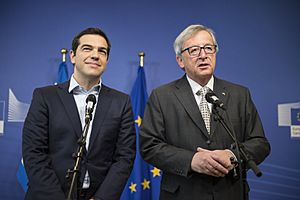
On June 27, 2015, Tsipras announced a referendum. This vote would decide if Greece should accept the bailout conditions. These conditions were proposed by the European Commission, the International Monetary Fund, and the European Central Bank.
Tsipras encouraged people to vote "No." He told a large crowd in Athens that the vote was about living with dignity in Europe. On July 5, 2015, 61.3% of Greeks voted "No."
Bailout Agreement and Resignation
After the referendum, Tsipras continued negotiations. On July 13, 2015, he reached an agreement with lenders. Greece would receive a large loan. In return, Greece had to agree to more strict measures. These included higher taxes, pension reforms, and privatization of state assets.
On August 14, the Greek parliament approved the new bailout deal. Many Syriza MPs voted against it. Tsipras had to rely on support from other parties. He said it was the best deal they could get.
On August 20, 2015, Tsipras resigned as Prime Minister. This was due to disagreements within his own party. He called for a new election. An interim prime minister was appointed until the elections.
Second Term as Prime Minister
Re-election and New Government
In the September 2015 election, Tsipras led Syriza to another victory. Syriza won 35.50% of the vote. This allowed them to form a government again with the Independent Greeks party.
In October 2015, Tsipras removed Greece's top tax collection official. This caused some backlash. Farmers and pharmacists protested against the government's financial measures. In November 2015, Tsipras faced angry protesters at a refugee camp in Lesbos.
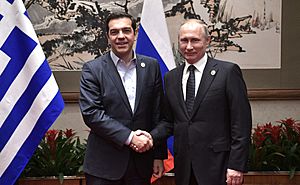
In November 2015, Tsipras became the first Greek prime minister to visit İzmir, Turkey, in a long time. He met with the Turkish Prime Minister. They agreed to work together on the refugee crisis.
In December 2015, Tsipras introduced a law allowing civil partnerships for same-sex couples. This bill was approved by the Greek Parliament. In May 2018, a law allowing adoption for same-sex couples was also passed.
In May 2016, new money-saving measures proposed by Tsipras passed Parliament. These laws increased taxes and cut pensions. They also included "contingency" measures for future budget targets. Tsipras defended these measures, saying they were needed for Greece's economic recovery.
The economic policies of his government were often seen as following European Union rules. This led to strong opposition from some on the left. Some Syriza MPs even left the party.
In July 2017, Tsipras said the Greek economy was improving. He was confident that Greece would no longer need bailouts by 2018. Greece started considering borrowing money from the bond market again.
In October 2017, Prime Minister Tsipras met with President Donald Trump at the White House. Trump supported a plan to help Greece with its debt. He also mentioned a possible sale to upgrade Greece's F-16 aircraft.
Greece officially finished its three-year financial assistance program on August 20, 2018. This was a big moment for the country. Tsipras said it was "the beginning of a new era." He stated that Greece had regained its ability to decide its own future.
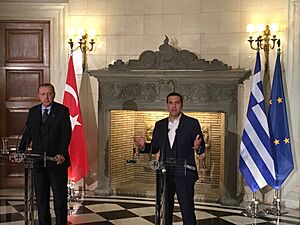
In January 2019, Greece's Defence Minister resigned. This was over a deal about the name of Macedonia. Despite this, Tsipras won a confidence vote in parliament. His government continued with the support of Syriza.
His government also passed social reforms. These included increasing the minimum wage and improving healthcare and education. These reforms aimed to balance the agreements with Europe and fight poverty.
Syriza lost the European election in May 2019. This led to new national elections. Syriza was defeated again in the 2019 legislative election. They also lost in the 2023 elections. Alexis Tsipras resigned on June 29, 2023. He said the party needed to renew itself.
Resolving the Macedonian Naming Dispute
During his second term, Tsipras worked to solve a long-standing dispute with Greece's northern neighbor. This was about the name of the country, known as the Macedonia naming dispute. The new Prime Minister of Macedonia, Zoran Zaev, also wanted to resolve the issue.
In January 2018, talks began again. The UN Envoy suggested five names that included "Macedonia." Zaev announced that places named after ancient Macedonian heroes would be renamed. For example, the Alexander the Great Highway could become "Friendship Highway." In return, Greece would support Macedonia's efforts to join European agreements.
In February 2018, Macedonia stopped a program that aimed to make its capital look more classical. They also began removing some controversial statues. In Spring 2018, Greek and Macedonian foreign ministers met often. They made good progress on the naming dispute.
On June 12, 2018, Tsipras announced an agreement with Zaev. The former Republic of Macedonia would be renamed the Republic of North Macedonia. This new name would be used for all purposes. The agreement also recognized the Macedonian language. It clarified that the citizens of North Macedonia were not related to ancient Greek civilization.
On July 5, the Macedonian parliament approved the Prespa agreement. On July 11, NATO invited North Macedonia to start talks to become its 30th member. On September 30, North Macedonia held a referendum on changing the country's name. The vote to amend the constitution passed on January 11, 2019. The agreement became official after the Greek Parliament approved it.
Personal Life
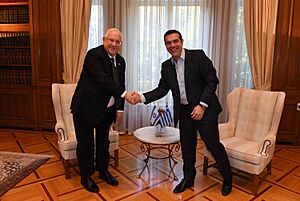
Alexis Tsipras is not married. His partner is Peristera "Betty" Baziana. She is an electrical and computer engineer. They met in high school in 1987. They both joined the Communist Youth of Greece. They live in Athens and have two sons. Their younger son's middle name is Ernesto, honoring Che Guevara.
Tsipras is a fan of football and supports the team Panathinaikos. He is an atheist. His cousin, Giorgos Tsipras, is also a Syriza MP.
See also
 In Spanish: Alexis Tsipras para niños
In Spanish: Alexis Tsipras para niños
- Politics of Greece
 | James Van Der Zee |
 | Alma Thomas |
 | Ellis Wilson |
 | Margaret Taylor-Burroughs |


